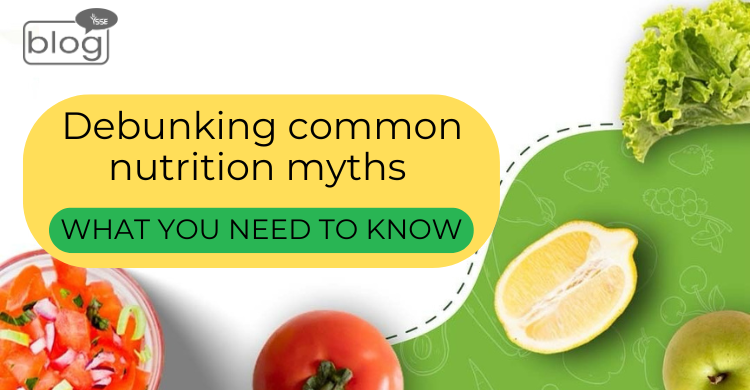It’s relatively easy to get lost in even a single impossibly messy maze of would-be nutrition during a dieting fad, with all its miracle solutions. These confusions can quite complicate our oaths towards developing a better lifestyle, which could lead to really unhealthy eating habits sometimes. Let’s debunk common nutrition myths, get enlightened for real, and drown out the noise.
Myth 1: Carbs are the Enemy
Carbs have been demonized for the better part of eternity and have thereby made many people believe that they are the culprit in the cycle of weight gain. However, not all carbs are created equal. Refined carbohydrates (from white bread to sweetened drinks) do not provide any value in the nutrition department as they contribute to blood sugar spikes, while complex carbohydrates (whole grains, fruits, and vegetables) are the basic essence of energy, fiber, and general health.
Reality: If you focus on complex carbohydrates and limit refined ones. Carbs are a vital source of energy and should be a part of a balanced diet.
Myth 2: Skipping Meals Helps You Lose Weight
A lot of people trying to lose weight will commonly miss their breakfast meal simply because they think that, as a rule of thumb, skipping breakfast will make them lose weight. However, most of the time, this works against them. Skipping meals leads the person to overeat late in the day. This way, metabolism either slows or crashes as well as energy.
Reality: Focus on having consistently balanced meals throughout the day so that there is a healthy metabolism and a lesser likelihood of overeating. Fill yourself with energizing nutrient-rich meals.
Myth 3: All Fats Are Bad
For many years now, a myth has existed about all fats being harmful. The truth is that trans fats and some kinds of saturated fats are dangerous; good fats are essential for properly functioning brains, hormones, and absorption of nutrients.
Reality: Include healthy fats from avocados, nuts, seeds, and olive oil. Such fats are necessary for health and provide nutrients.
Myth 4: Detox Diets are Required for Cleansing
Detox diets tend towards a very limited diet (often juice cleansing) and affect the purification of the body from toxins. However, we have natural detoxification systems, the main one being the liver, but also the kidneys.
Reality: A wholesome diet with plenty of fruits and vegetables and a little drink promotes the body’s detoxification processes. Whole foods help one avoid typical crash diets with a high potential for nutrient deficiencies.
Myth 5: Eating after 8 PM always leads to weight gain
Consumers often subscribe to the idea that eating late at night leads to weight gain. However, the truth is that weight is gained during the day by the total calories consumed every day, not down to what time you ate them.
Reese’s Reality: Heavy meals right before bedtime are generally not encouraged, but if you are indeed hungry, a small snack is perfect. It’s all about general calorie count and nutrient balance.
Myth 6: “Superfoods” are a Magic Bullet
While nutrient-packed superstars like blueberries and kale don’t magically fix broken health or weight loss, they do seem to work wonders in this area.
Reality: Eating whole foods in diversity is far more effective than concentrating on eating a few “superfoods.” Incorporate a diversity of fruits, vegetables, lean proteins, and whole grains for a healthy diet.
Myth 7: Supplements Can Replace a Healthy Diet
Supplements can help to some extent when it comes to specific nutrient deficiencies but cannot replace a diet.
Reality: The focus should rather be on nutrient intake from whole foods whenever one can do so. Substitutes are only meant to supplement a healthy eating plan and not overshadow it. Do consult the respective health practitioner before beginning any new supplement regimen.
Nutrition is indeed very tricky, but it is important to know the truth behind some of these common myths to make better choices. These myths thus empower us to have healthier choices and make a positive relationship with food.
To read more blogs like this, click here.
Writer
Mahfuza Amir Ela
Intern, Content Writing Department
YSSE

